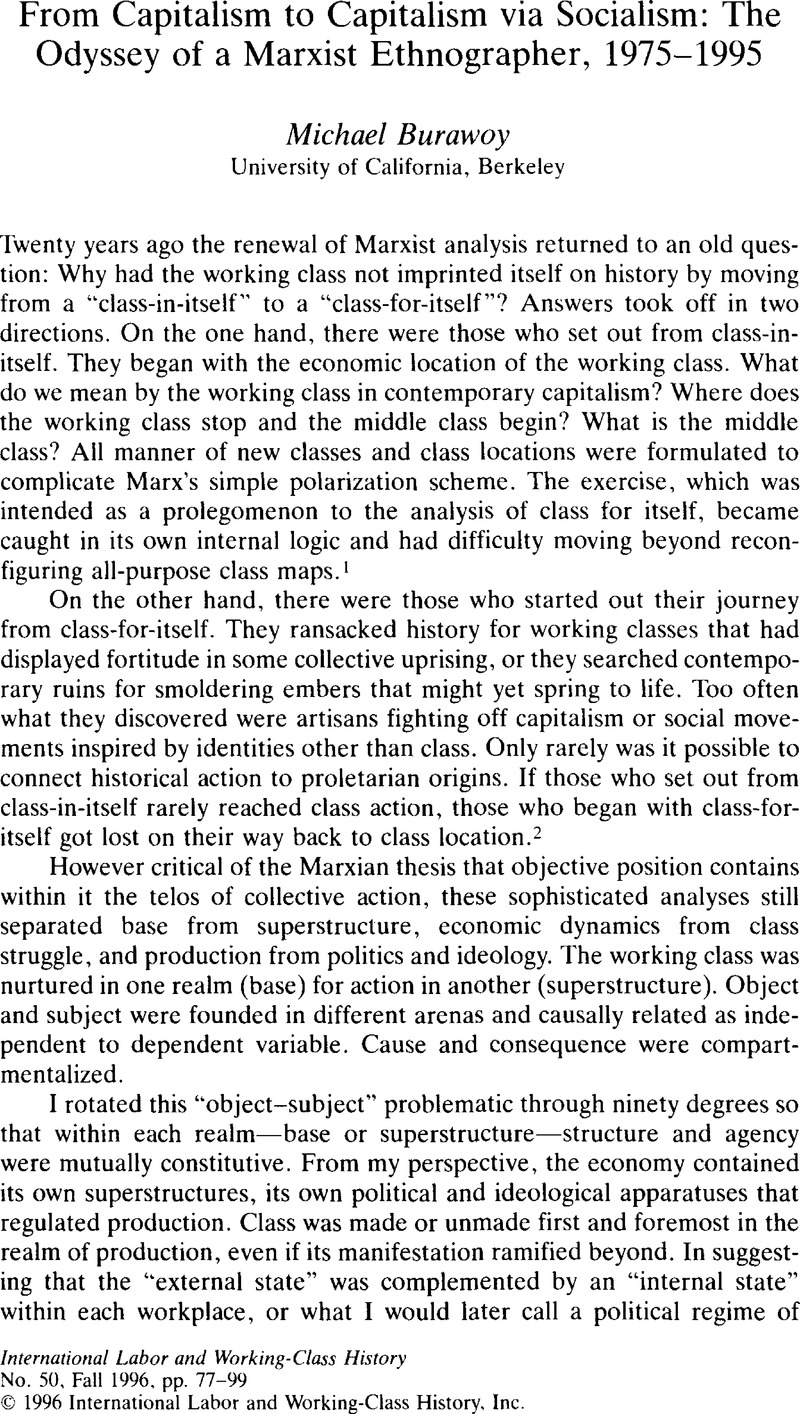Published online by Cambridge University Press: 16 December 2008

I should like to thank Steve Lopez, Teresa Gowan, Lynne Haney, Sheba George, Millie Thayer, Maren Klawiter, Stephen Kotkin, and Eddie Webster for their comments. Erik Wright has been with me from the beginning, always pointing to major pitfalls in my claims and arguments. This time was no exception. The National Science Foundation, the MacArthur Foundation, the Social Science Research Council, and the Institute of Industrial Relations at Berkeley have generously supported my research on the way.
1. Perhaps the most well-known class maps are those of Braverman, Harry, Labor and Monopoly Capital (New York, 1974);Google Scholarand Wright, Erik, Classes (London, 1985)Google Scholarand Class Counts: Comparative Studies in Class Analysis (Cambridge, 1996).Google ScholarFor my debate with Wright, see Wright, Erik et al. , The Debate on Classes (London, 1989), chap. 2.Google Scholar
2. Most obviously there is the tradition bequeathed by Thompson's, E. P.The Making of the English Working Class (London, 1963),Google Scholar and a huge literature on new social movements pioneered by Tilly, Charles, Touraine, Alain, and others. I developed my critique of class as “effect” in commentaries on the work of Adam Przeworski, especially his Capitalism and Social Democracy (Cambridge, 1985).Google ScholarFor this debate see Carver, Terrell and Thomas, Paul, Rational Choice Marxism (New York, 1995), chaps. 5–7.CrossRefGoogle Scholar
3. Foucault, Michel, Discipline and Punish (New York, 1977);Google ScholarFoucault, , Power! Knowledge: Selected Interviews and Other Writings, ed. Gordon, Cohn (New York, 1978).Google Scholar
4. In my case, there are two other subdialogues contained in the one between theory and ethnography. The first is within theory itself, which includes my many debates with other scholars and colleagues as well as the experience of and teaching and working with the extraordinary graduate students at Berkeley. The second subdialogue is the interaction between myself and those I studied, often mediated by superb collaborators in the field. In this paper, however, I have subordinated these two constitutive dialogues to the evolutionary exchange between theoretical framework and fieldwork.
5. There is a voluminous literature on the Western Electric studies, but the major source for the research and its results is Fritz Jules Roethlisberger and Dickson, William, Management and the Worker (Cambridge, 1939).Google Scholar
6. Sec Roy, Donald. “Efficiency and the Fix: Informal Intergroup Relations in a Piecework Machine Shop.” American Journal of Sociology 60 (1954):255–66;CrossRefGoogle ScholarRoy, . “Quota Restriction and Goldbricking in a Machine Shop.” American Sociological Review 57 (1952):158–68Google ScholarLupton, Tom. On the Shop Floor (Oxford, 1963).Google Scholar
7. Burawoy, Michael. Manufacturing Consent: Changes in the Labor Process Under Monopoly Capitalism (Chicago. 1979). This book was heavily influenced by Gramsci and by the French structuralist Marxism of Louis Althusser and Nicos Poulantzas.Google Scholar
8. Roy, Donald, “Restriction of Output in a Piecework Machine Shop.” Ph.D. dissertation. University of Chicago. 1952.Google Scholar
9. Gramsci, Antonio, Selcctions from the Prison Notebooks (New York. 1971). 277–318.Google Scholar
10. Haraszti, Miklos. A Worker in a Worker's State (Harmondsworth. 1977).Google Scholar
11. Burawoy, Michael. The Politics of Production: Factory Regimes Under Capitalism and Socialism (London. 1985). chap. 4.Google Scholar
12. I had also studied a different type of despotism—colonial despotism—in the Zambian copper mines. Based on four years of fieldwork from 1966 to 1972. I analyzed the uneven persistence of colonial despotism even after the attainment of political independence. See Burawoy, . The Politics of Production, chap. 5.Google Scholar
13. chapter 2. For brilliant elaborations of this comparative approach showing the links between factory politics and wider struggles. see Biernacki's, Richard comparison of the nineteenth-century textile industry in England and Germany. The Fabrication of Labor (Berkeley. 1995).Google Scholarand Haydu's, Jeffrey comparisons of metal workers in England and the United States at the turn of the century. Between Craft and Class (Berkeley. 1988).Google Scholar
14. Burawoy, . The Politics of Production, chap. 3.Google Scholar
15. This point is elaborated in detail by Johnston, Paul. Success While Others Fail (Ithaca. 1994).Google Scholar
16. Burawoy, Michael and Lukhcs, J´nos. The Radiant Past: Ideology and Reality in Hungary's Road to Capitalism (Chicago. 1992). chap. 2.Google Scholar
17. Braverman, . Labor and Monopoly Capital. Braverman argued that a distinctive dynamic of monopoly capitalism was the managerial expropriation of skill, or what he called the separation of conception and execution. This now-classic work has been subjected to intense criticism, but my studies of socialist production vindicate his delineation of the specificity of the capitalist labor process.Google Scholar
18. Burawoy, and Lukács, The Radiant Past, chap. 3.Google Scholar
19. Ibid., chap. 4.
20. Ibid., chap. 5.
21. On VGMKs. see Stark, David. “Rethinking Internal Labor Markets: New Insights from a Comparative Perspective,” American Sociological Review 51 (1986):492–504.CrossRefGoogle Scholar
22. For an excellent example of how to problematize both factory politics and global politics. see Fuller, Linda. Work and Democracy in Socialist Cuba (Philadelphia. 1992). Fuller shows how Cuba's politics of decentralization in the late 1960s led to greater democratization of production politics, and how this in turn fed back into global politics.Google Scholar
23. Burawoy, Michael and Hendley, Kathryn. “Between Perestroika and Privatization: Divided Strategies and Political Crisis in a Soviet Enterprise.” Soviet Studies 44 (1992):371–402.CrossRefGoogle Scholar
24. Burawoy, Michael and Krotov, Pavel, “The Soviet Transition from Socialism to Capitalism: Worker Control and Economic Bargaining in the Wood Industry,” American Sociological Review 57 (1992): 16–38.CrossRefGoogle Scholar
25. Burawoy, Michael, “State and Economic Involution: Russia Through a Chinese Lens,” World Development 24 (1996):1105–17.CrossRefGoogle Scholar
26. Burawoy, Michael and Krotov, Pavel, “The Economic Basis of Russia s Political Crisis.” New Left Review 198 (1993):49–70.Google Scholar
27. Burawoy, Michael and Krotov, Pavel, “Russian Miners Bow to the Angel of History,” Antipode 27 (1995):115–36.CrossRefGoogle Scholar
28. Here I am indebted to Konrád, Georg and Szelenyi's, Ivan classic The Intellectuals on the Road to Class Power (New York, 1979).Google Scholar
29. Lukács, Georg. History and Class Consciousness (Cambridge, 1971).Google Scholar
30. This view of the history of Marxism is elaborated in Burawoy, Michael. “Marxism as Science: Historical Challenges and Theoretical Growth,” American Sociological Review 55 (1990):775–93.CrossRefGoogle Scholar